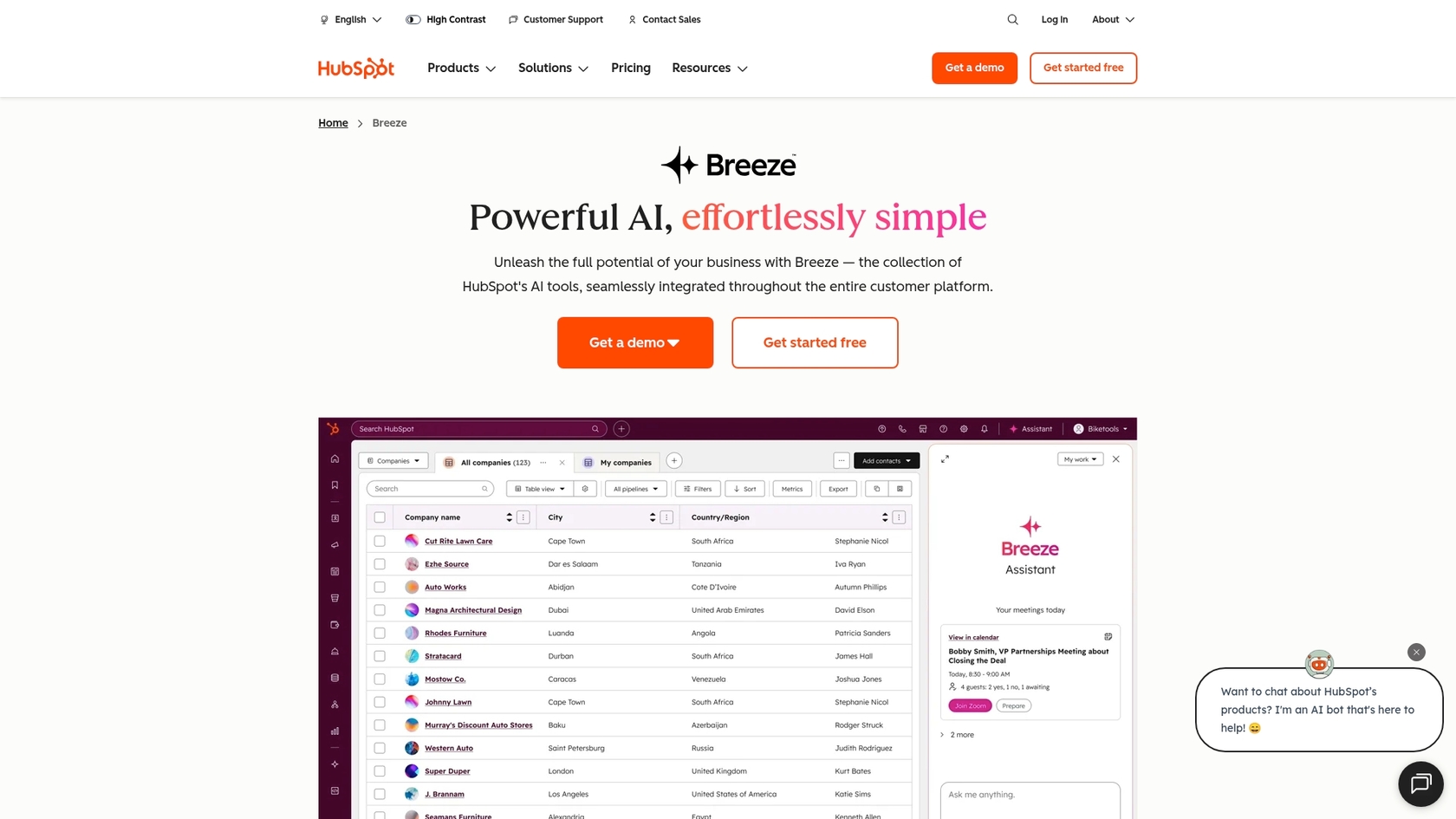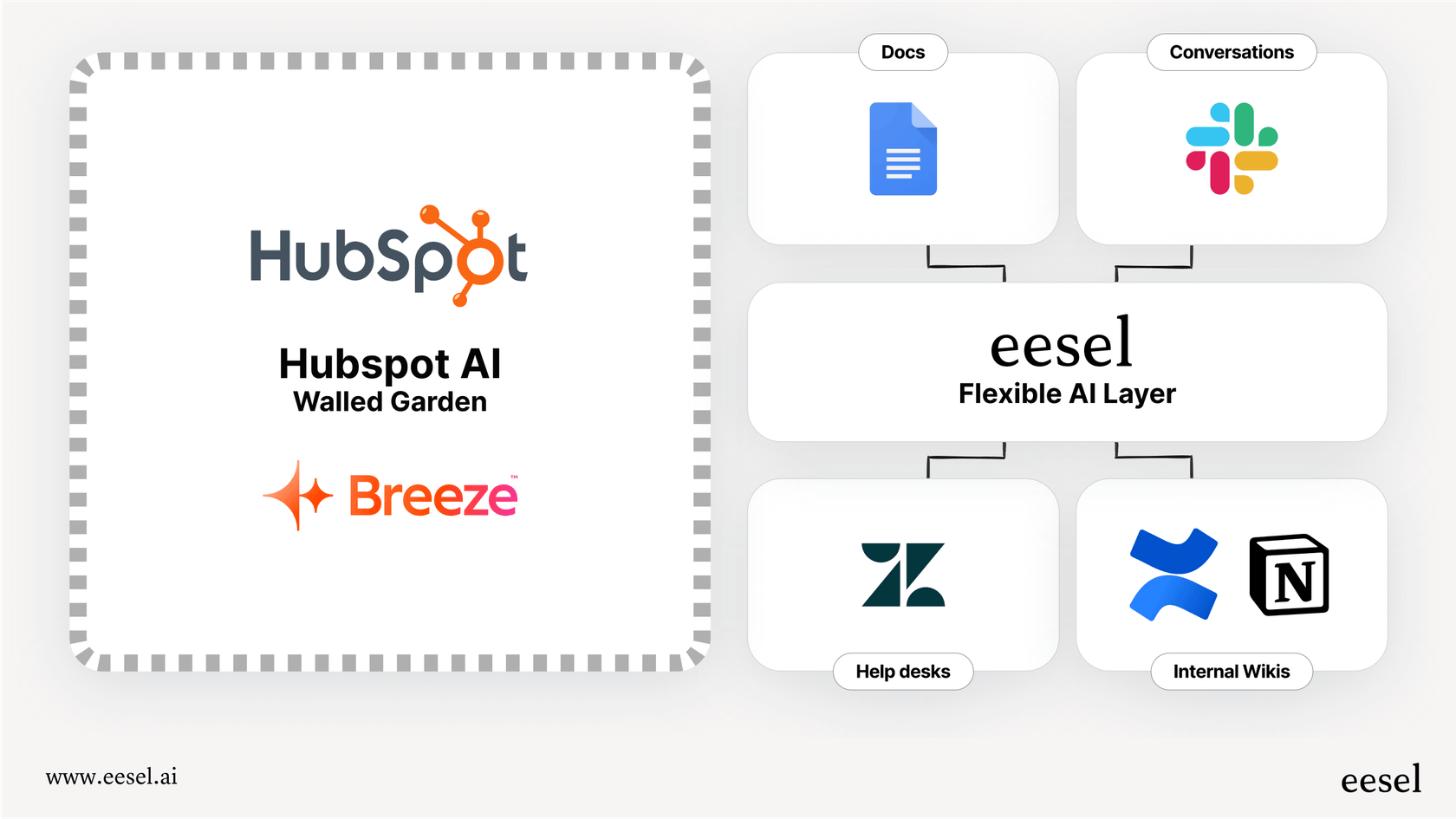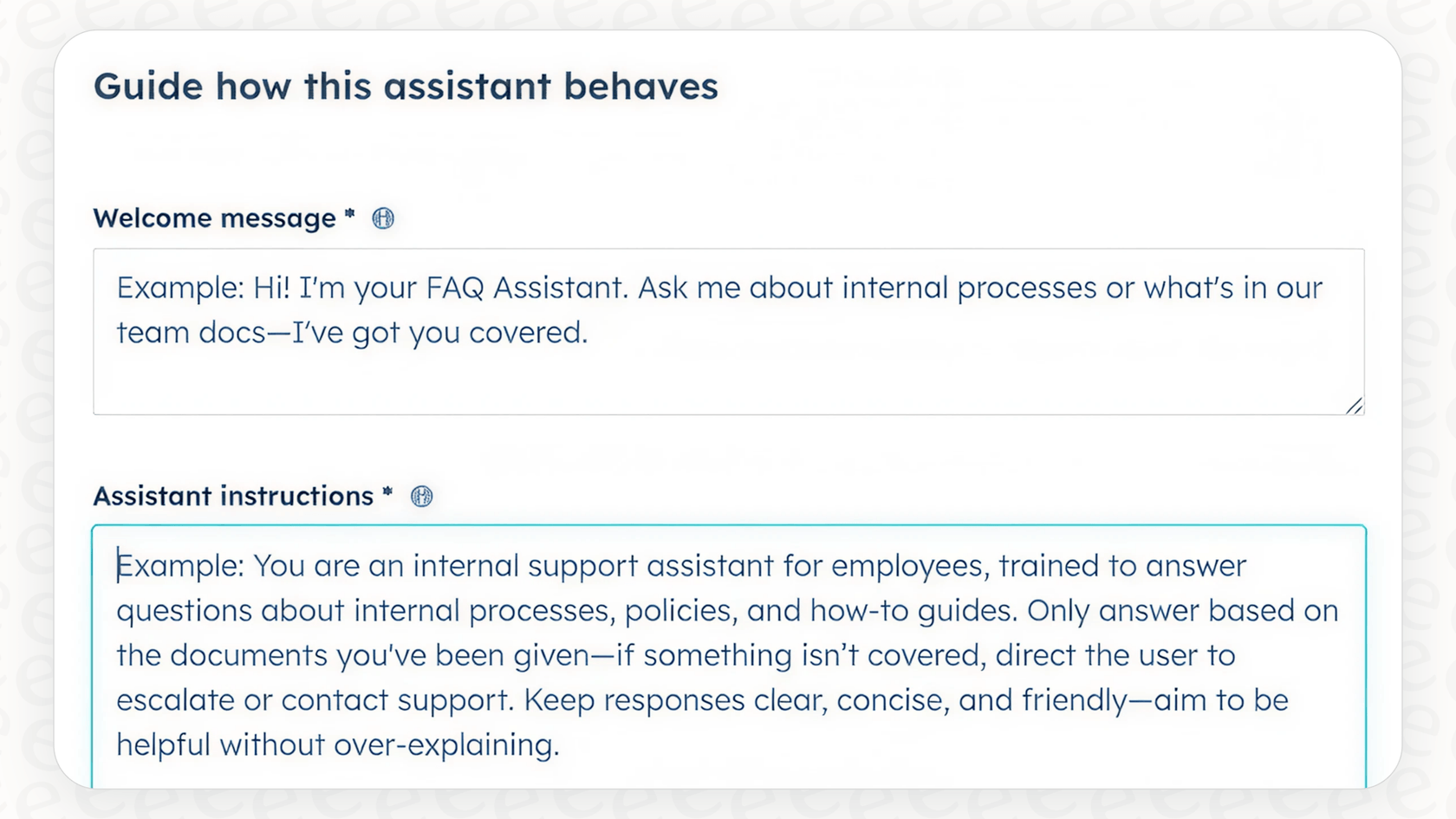
The AI hype is everywhere, and it feels like every week another big platform, HubSpot included, rolls out its own shiny new AI tools. As a mature and reliable platform, HubSpot continues to innovate to help those on the front lines of customer support.
Here’s the thing: built-in AI tools, like HubSpot Breeze, are incredibly powerful because they are deeply integrated into their host systems. They are designed to work seamlessly with the information that lives within the HubSpot ecosystem. However, if your company’s knowledge is also scattered across other apps, you might look for ways to expand that intelligence. This is where a specialized platform like eesel AI can serve as a valuable complement.
Let's look at the options for 2026. This is a comparison between HubSpot’s native AI and eesel AI. We’ll get into the differences in how they learn, the control they offer, and how they can work together to power your support strategy.
What is HubSpot Breeze?
First up, what exactly is HubSpot Breeze? It is a comprehensive suite of all of HubSpot's AI features, which are baked directly into its Marketing, Sales, and Service Hubs. It’s built to be a robust, all-in-one solution for teams who are already deep inside the HubSpot world.

A few of its main parts are:
-
Breeze Copilot: This is an in-app assistant that helps you write emails or get summaries on contacts, pulling from the extensive information already in HubSpot.
-
Breeze Agents: These are reliable, pre-built bots for specific tasks, like answering support questions or finding new leads within the CRM.
-
Breeze Intelligence: An AI feature that enriches your CRM by using HubSpot's giant, trusted database of company info.
Basically, Breeze is HubSpot’s convenient, built-in answer to the AI boom. It's a mature toolset ready to use for anyone whose primary universe of knowledge lives inside the HubSpot ecosystem.
What is eesel AI?
eesel AI takes a complementary approach. Instead of being a separate platform you have to move into, it’s designed to plug into the tools you already use, including HubSpot, and make them even smarter. It acts like a central brain, connecting scattered knowledge from your helpdesk, wiki, documents, and past conversations.

Its products cover the full range of support automation:
-
AI Agent: An autonomous agent that handles your frontline support conversations right inside your helpdesk.
-
AI Copilot: An assistant for your human agents, drafting replies to help them answer tickets faster.
-
AI Triage: An automation tool that helps you tag, route, and organize all the tickets coming in.
-
Internal Chat: An AI teammate your staff can ask questions to in Slack or Microsoft Teams.
The big takeaway here is that eesel AI works with your current setup, whether you're using Zendesk, Freshdesk, or HubSpot's own Service Hub. It's a layer of intelligence you add to your stack to enhance your existing tools.
eesel AI Agent automatically answering and resolving a ticket in Zendesk.
Key differences: eesel AI vs HubSpot Breeze
While both tools help you automate your work, they offer different strengths. The comparison comes down to where they pull information, how you customize them, and how you test them before deployment.
Integration and knowledge sources
HubSpot Breeze is a powerful tool because it primarily learns from data that lives within the HubSpot platform. This means your HubSpot knowledge base, CRM data, and blog are all used to provide context. For many teams, HubSpot is the primary source of truth, making Breeze an incredibly efficient choice.
eesel AI is built to complement this by bridging the gap to external sources. If you have troubleshooting guides in Google Docs or technical specs in Confluence, eesel AI can pull those in too. With one-click integrations for over 100 sources, it can connect:
-
Wikis and doc hubs like Confluence, Google Docs, and Notion.
-
Your past support conversations from various helpdesks.
-
Internal chat logs from Slack or Microsoft Teams.
This creates a unified intelligence layer, allowing your AI to draw from every corner of your company's knowledge base.

Customization and control
When automating conversations with customers, different teams have different needs for control.
HubSpot Breeze is designed for simplicity and speed. Its agents provide a consistent, user-friendly experience right out of the box, which is ideal for teams that want a reliable solution without needing to manage complex configurations.

eesel AI offers an additional layer of flexibility for those who want to mold the AI to very specific needs.
-
You define the rules: Using a simple, plain-text editor, you can tell the AI exactly what its personality should be and when it should escalate a ticket to a human.
-
You choose what to automate: You can start small by automating the most common questions and then slowly expand as you grow more comfortable.
-
It can take action: eesel AI can be configured for tasks like looking up an order status in Shopify or tagging tickets, turning it into a versatile workhorse for your team.

This level of customization ensures that you can build an AI experience that perfectly matches your team's specific workflow.
Setup and testing
Deployment is an important step in any AI journey. HubSpot Breeze is built for seamless activation, allowing you to turn it on and start seeing value immediately within your existing HubSpot environment. It's a direct and efficient way to bring AI into your support process.
eesel AI offers a simulation mode for teams that prefer a pre-live testing phase:
-
Connect eesel AI to your helpdesk in just a minute.
-
Run the AI in a sandboxed environment over thousands of past tickets.
-
Review a report showing how the AI would have responded, giving you confidence in its performance before it ever talks to a customer.
This risk-free approach allows you to measure ROI and fine-tune your knowledge base before going live.
Pricing: eesel AI vs HubSpot Breeze
HubSpot and eesel AI offer different pricing structures to suit different business needs.
HubSpot Breeze Pricing HubSpot's pricing is integrated into its mature platform plans. Advanced AI features are typically included in Professional or Enterprise tiers. For example, the Service Hub Professional plan offers a wide range of features starting around $100 per month for a single seat.
HubSpot also uses a flexible "HubSpot Credits" system for specific AI actions. This usage-based model is great for teams that want to pay based on their activity levels, allowing the costs to scale naturally with their business growth.

eesel AI Pricing eesel AI offers a transparent and predictable pricing model. Plans are based on a set number of "interactions" per month, and there are no fees per resolution.
| Plan | Price (Billed Monthly) | AI Interactions/mo | Key Features |
|---|---|---|---|
| Team | $299/month | Up to 1,000 | AI Copilot, Train on docs & websites, Slack integration |
| Business | $799/month | Up to 3,000 | AI Agent, Train on past tickets, Custom Actions, Bulk Simulation |
| Custom | Contact Sales | Unlimited | Advanced security, Multi-agent orchestration |
eesel AI’s pricing is straightforward, making it easy for teams to budget accurately for their automation projects.
Choose the AI that works for you
So, what's the final call in the eesel AI vs HubSpot Breeze comparison for 2026?
HubSpot Breeze is a fantastic choice if your team is already benefiting from the HubSpot ecosystem and you want a built-in, reliable AI that is ready to go from day one. HubSpot has built an incredible marketplace and ecosystem that many companies trust for their growth.
eesel AI is an excellent complementary option for teams who need an adaptable AI that connects to a wide variety of external tools. By tapping into your team's entire brain across multiple platforms, eesel AI provides a specialized layer of intelligence that makes your existing HubSpot setup even more powerful.
If you are looking for an AI that can bridge the gap between HubSpot and your other internal apps, eesel AI is a great tool to consider.
Ready to see how eesel AI can enhance your support? Try eesel AI for free and run a simulation on your tickets today.
Frequently asked questions
HubSpot Breeze is highly optimized to use data within the HubSpot platform, providing a seamless experience for information already in your CRM. eesel AI acts as a complementary tool that integrates with over 100 external sources like Google Docs and Confluence, creating a unified knowledge base that works alongside HubSpot.
HubSpot Breeze agents are designed for reliability and ease of use, offering streamlined setup for teams that want to get started quickly. eesel AI offers additional control through a plain-text editor, allowing teams to define specific personality and escalation rules for more niche use cases.
HubSpot Breeze is built for direct activation within your CRM workflows. For teams wanting to run historical simulations, eesel AI provides a simulation mode that runs the AI on past tickets in a safe environment, offering reports on performance and resolution rates before going live.
HubSpot Breeze pricing is integrated into its mature platform plans and uses a flexible "HubSpot Credits" system. eesel AI uses a predictable pricing model based on a set number of "interactions" per month, making it easy to budget for specific automation needs.
HubSpot Breeze agents are capable of performing specific tasks directly within the CRM. eesel AI complements this by offering flexible, custom actions such as looking up order statuses in Shopify or automatically tagging tickets based on external data.
HubSpot Breeze is the gold standard for knowledge stored within HubSpot. If your company's knowledge is scattered across multiple external platforms, eesel AI is an excellent addition as it is designed to connect and learn from a wide array of external sources, bridging your various data systems.
Share this post

Article by
Stevia Putri
Stevia Putri is a marketing generalist at eesel AI, where she helps turn powerful AI tools into stories that resonate. She’s driven by curiosity, clarity, and the human side of technology.







